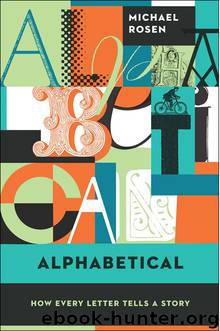Alphabetical by Michael Rosen

Author:Michael Rosen [Rosen, Michael]
Language: eng
Format: epub
ISBN: 9781619025165
Publisher: Counterpoint
O IS FOR OK
. . . BUT IS IT OK to write OK, Ok, Okay and ok? And should people who say, ‘Okily-dokily’ be given a custodial sentence?
When zoologists looked at the duck-billed platypus, they had problems. They had their way of classifying animals but this beast didn’t fit. What’s more, it looked like a hoax. The duck-billed platypus was fine – it’s still fine; it just goes on being a duck-billed platypus. It doesn’t wonder what kind of animal it is.
OK is a duck-billed platypus.
We have no fixed way of writing ‘OK’ because we don’t know whether it is two initials or a transcription of a non-English word. Either way, it sounds like two letters. It may well have started out in life as an ‘interjection’ – like ‘uh-huh’ – but it has now risen to the status of a word. Look at it: one moment, it’s being adjectival and the next, adverbial:
‘You’re an OK sort of a guy.’ (adjective)
‘If you can run OK, you’ll be picked for the team.’ (adverb)
‘I’ve given him the OK to run.’ (noun)
‘I’ve okayed him for the race.’ (verb)
Unlike the platypus, OK lives everywhere. There are few places left in the world where an ‘OK!’ accompanied by a smile and a nod would be misunderstood. And unlike the platypus, it can acquire appendages: A-OK, okey-dokey, hokie-dokie and the aforesaid okily-dokily.
It is clearly a popular, useful and powerful word. It works. It even has its own hand-sign: tip of the first finger on to the tip of the thumb to make an o-shape, the other four fingers raised, though that seems to be an OK-plus, a better-than-just-OK kind of OK. You might have thought, with all that going for it, that we would be proud that humanity had invented a noise that could do so much for so many. Not so. In many circles, it is a despised little expression, seen as lazy, imprecise, slangy and – in some countries – an unwelcome Americanism. It’s a low-status word even when used by high-status people. If a prime minister or president wants to sound informal, he or she will use ‘OK’. In a formal setting, as in a news broadcast, it won’t make the grade. You’ll be told to not use it in a job application or in an essay on the causes of the First World War.
There isn’t a clear answer why ‘OK’ hasn’t been allowed into the academy that is formal prose writing. I suspect it’s a cluster of connotations to do with its origins and its sound. I’ll get on to the theories of its precise origins in a moment, but whatever these are, ‘OK’ took up a regular posting in the informal speech of non-posh Americans just as ‘gee!’ and ‘wow!’ have. Once a word is situated in a place like that, it’s hard for it to fight its way into formal writing. Whatever its virtues, standard English is also a code which signals that the writer has had a particular kind of education.
Download
This site does not store any files on its server. We only index and link to content provided by other sites. Please contact the content providers to delete copyright contents if any and email us, we'll remove relevant links or contents immediately.
Cecilia; Or, Memoirs of an Heiress — Volume 1 by Fanny Burney(32533)
Cecilia; Or, Memoirs of an Heiress — Volume 2 by Fanny Burney(31931)
Cecilia; Or, Memoirs of an Heiress — Volume 3 by Fanny Burney(31920)
The Lost Art of Listening by Michael P. Nichols(7483)
Asking the Right Questions: A Guide to Critical Thinking by M. Neil Browne & Stuart M. Keeley(5745)
We Need to Talk by Celeste Headlee(5602)
On Writing A Memoir of the Craft by Stephen King(4921)
Dialogue by Robert McKee(4377)
Pre-Suasion: A Revolutionary Way to Influence and Persuade by Robert Cialdini(4198)
I Have Something to Say: Mastering the Art of Public Speaking in an Age of Disconnection by John Bowe(3867)
Elements of Style 2017 by Richard De A'Morelli(3335)
The Book of Human Emotions by Tiffany Watt Smith(3284)
Fluent Forever: How to Learn Any Language Fast and Never Forget It by Gabriel Wyner(3068)
Name Book, The: Over 10,000 Names--Their Meanings, Origins, and Spiritual Significance by Astoria Dorothy(2966)
Why I Write by George Orwell(2937)
Good Humor, Bad Taste: A Sociology of the Joke by Kuipers Giselinde(2936)
The Art Of Deception by Kevin Mitnick(2782)
The Grammaring Guide to English Grammar with Exercises by Péter Simon(2731)
Ancient Worlds by Michael Scott(2663)
